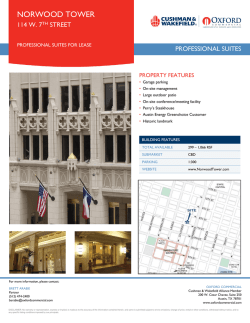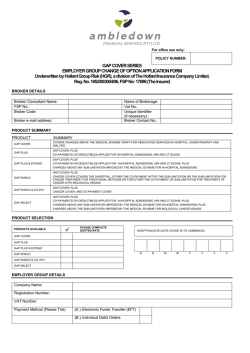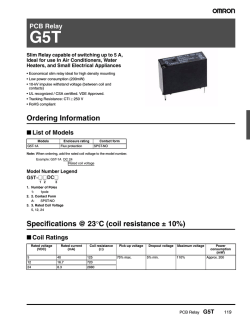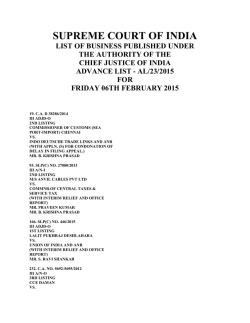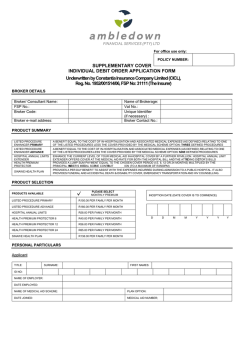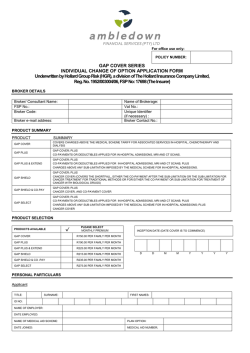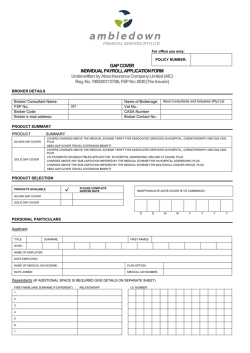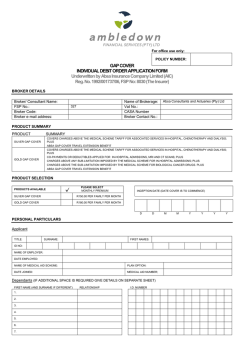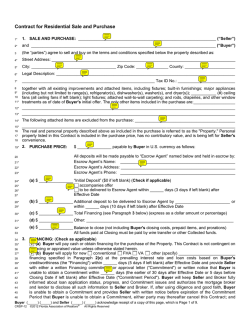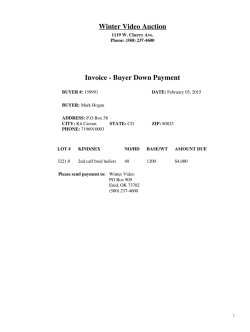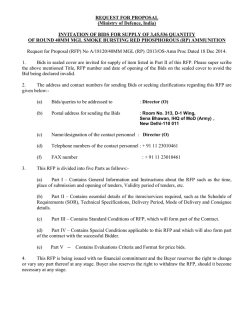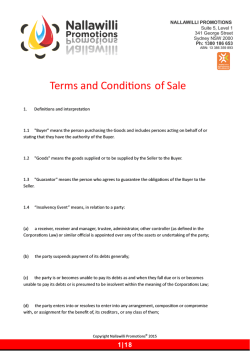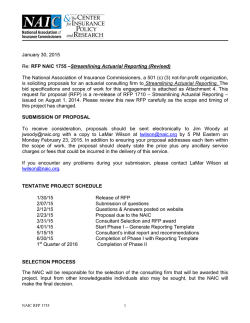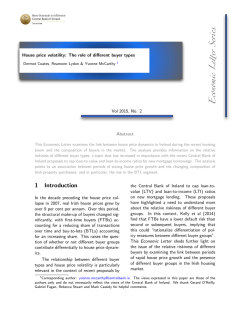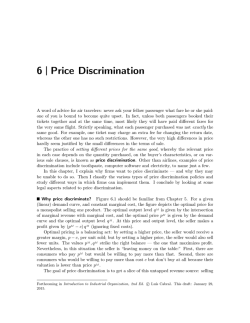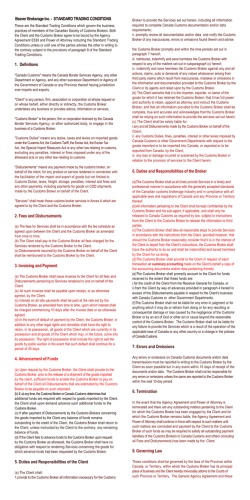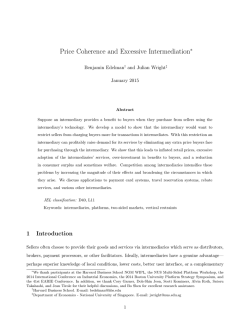
Legal Ease - Georgia Association of Realtors
Legal Ease ReFORMed THE 2015 GAR FORMS AT THE BEGINNING OF EVERY YEAR, THE GAR FORMS COMMITTEE RELEASES A NEW SET OF GAR FORMS (“FORMS”) FOR USE BY REALTORS® AND OTHERS W H O P U RC H AS E T H E R I G H T TO U S E T H E FO R M S. 20 1 5 I S N O E XC E PT I O N . CHANGES TO THE FORMS ARE NOT MADE LIGHTLY. EVERY CHANGE IS EXAMINED, RE-EXAMINED AND THEN EXAMINED AGAIN BY THE FORMS COMMITTEE TO ENSURE THAT EVERY CHANGE THAT IS MADE IS DELIBERATE AND ACCOMPLISHES ITS INTENDED GOAL. OVER THE LAST SEVERAL YEARS, A MAJOR FO C U S O F T H E FO R M S CO M M I T T E E H A S B E E N TO C R E AT E M O R E “ U S E R FRIENDLY” FORMS. IN THIS REGARD, THE CO M M I T T E E HAS CONTINUED TO REFORMAT ITS FORMS SO THAT WHEREVER POSSIBLE, ALL BLANKS APPEAR IN THE BEGINNING OF FORMS. In the 2015 Forms, the blanks in the brokerage engagement agreements and the GAR leases have all been moved to the front. The Forms Committee believes that when forms are easy for people to use and understand fewer mistakes and misunderstandings will occur. The Forms Committee also has twin goals of balancing the rights of buyers and sellers in real estate transactions while protecting the real estate brokers and licensees with whom buyers and sellers work. Let’s look at some of the more important changes in the 2015 Forms. 1 F20, Purchase and Sale Agreement Revised (A) EXTENSION OF DEADLINES. One question which regularly arises in contracts is when do deadlines that fall on a Saturday, Sunday or holiday get extended to the next business day? Rather than having parties and their REALTORS® debate this issue from trans- I 12 GEORGIA REALTOR® action to transaction, the GAR Forms Committee added language to the 2015 Purchase and Sale Agreement stating that: “No time deadline under this Agreement shall be extended by virtue of it falling on a Saturday, Sunday or federal holiday except for the date of closing.” Let’s look at the following example to better understand this new provision. A buyer makes a counteroffer that is open for acceptance by a seller until Sunday night at 10:00 p.m. Does this deadline extend to the next business day because it falls on a Sunday? Based on the new language in the GAR Purchase and Sale Agreement, the answer to this question is no. A deadline falling on a Saturday, Sunday or federal holiday is only extended to the next business day if it is the date of closing. If the closing is mistakenly scheduled on Christmas Day (a federal holiday), it would automatically be extended to the next business day. However, all other deadlines which fall on a Saturday, Sunday or federal holidays are not extended. I JANUARY FEBRUARY 2015 The Forms Committee believes that when forms are easy for people to use and understand fewer mistakes and misunderstandings will occur. (B) NO AUTHORITY TO BIND. Another issue which arises in real estate disputes is whether a party’s broker or affiliated licensee has the legal authority to bind the party. Now every real estate broker or licensee worth his or her salt knows that a party’s real estate broker or licensee has no authority to bind the party in a real estate transaction. However, it is amazing how many lawyers argue just the opposite in real estate disputes, particularly, if it suits their purposes. So, for example, in situations where there is no written contract signed by both the buyer and seller, a lawyer may argue that the broker or licensee of the party had the implied authority to bind the party and did so through some action on the part of the broker or licensee. To minimize the frequency of this argument being made, the GAR Forms Committee added language to the Purchase and Sale Agreement clearly stating that a party’s broker or affiliated licensee has no authority to bind the party simply because he or she is a broker or licensee for a party. While a real estate broker or licensee can legally bind his or her principal if the principal executes a power of attorney to that effect, this authority to bind comes from the power of attorney and not by virtue of the broker or licensee acting in the capacity of a broker or licensee. (C) REVISED NOTICE SECTION. The notice section of the GAR Purchase and Sale Agreement has long been one of the most debated sections of the GAR Purchase and Sale Agreement. Failing to give good notice or receive it can result in harsh consequences to a party. It should therefore come as no surprise that no matter what type of notice provision is included in a contract, there will always be situations where notice is sent but alleged not to have been received, not sent but alleged to have been sent or sent late but alleged to have been timely sent. For many years, notice sent by facsimile was given preference in the GAR Forms by providing that notice sent by I GEORGIA REALTOR® 1 3 facsimile was deemed received at the time it was sent under certain conditions. With facsimile technology now disappearing from the scene, the GAR Forms Committee is now also giving preference to other forms of electronic notice. The only form of notice that is not permitted under the 2015 GAR Forms is notice sent by telephone. So for example, in the 2015 Forms, a buyer cannot send a text or telephone message to a seller or the listing broker stating that the buyer is terminating the contract pursuant to the due diligence provision in the contract. However, this same notice can be sent by other electronic notices. The new notice requirement in the GAR Forms also requires that all notices be in writing, legible and signed by the party giving the notice. So, for example, if a buyer is giving notice of the buyer’s decision to terminate the contract pursuant to the due diligence period, the notice must be signed by the buyer. Of course, since electronic signatures are permitted under Georgia law, a buyer could send The buyer knows both of the seller’s e-mail addresses and sends the notice to the e-mail address not included in the purchase and sale agreement. In that instance, the GAR Purchase and Sale Agreement provides that the notice sent to an e-mail address not included in the purchase and sale agreement is not effective. Of course, even in the face of such a prohibition, if notice is sent to an e-mail address that is not included in the Purchase and Sale Agreement but it is nevertheless received and responded to, the party receiving the notice would likely have a difficult time denying the effectiveness of the receipt. The final change is the notice section is the addition of language stating that “In the event of a dispute regarding notice, the burden is on the party giving notice to prove delivery. Of course, since for example, notice by e-mail is deemed to be delivered and received upon sending an email to the other party’s e-mail address included in the contract, this should be all that is necessary to prove delivery. new notice requirement IN THE GAR FORMS ALSO REQUIRES THAT all notices be in writing, legible and signed BY THE PARTY GIVING THE NOTICE. THE an e-mail notice of termination to the seller or listing broker and merely type his or her name at the bottom of the e-mail as the buyer’s electronic signature. The new notice section of the Purchase and Sale Agreement also addresses in much greater detail when a notice is deemed to be delivered. A notice given in person is considered received when it is actually received by a party. In the case of notice sent by courier, overnight mail or other similar delivery where a receipt of delivery is generated, notice is deemed received at the time of delivery provided that a record of the delivery is generated. In the case of delivery by electronic means (such as by facsimile or email) the notice is deemed received when it is sent, provided it is sent to a facsimile number or e-mail address of the party set forth in the contract. So, for example, let’s say that a seller has two e-mail addresses and only includes one of them in the purchase and sale agreement. I 14 GEORGIA REALTOR® (D) FORM ALLOWS ADDITIONAL OPTION FEES TO BE COLLECTED BY SELLER FOR GRANTING THE RIGHT TO A DUE DILIGENCE PERIOD. For as long as there has been a Due Diligence Period in the GAR Purchase and Sale Agreement, the contract has also included a reference to $10.00 in option money being paid by the buyer to the seller as consideration for the granting of such a Due Diligence Period. The reason for this is that the grant of a Due Diligence Period is viewed as the grant of an option during which the buyer can decide whether or not to purchase the property. Under Georgia law, separate consideration must be paid for the grant of this type of option. In the new GAR Purchase and Sale Agreement, a line has been added where the seller can seek option money for the seller granting an option period in addition to the $10.00 already referenced in the Purchase and Sale Agreement. I JANUARY FEBRUARY 2015 Let’s look at the following example to better understand this change. Let’s say that a seller is selling an expensive home and receives multiple offers. The seller wants to ensure that the ultimate buyer is serious about buying the property and is not merely putting the property under contract only to then leisurely decide whether or not to buy the property. One way to try to accomplish this is for the seller to negotiate for the buyer to pay $500.00 in additional non-refundable option money to confirm the buyer’s commitment to following through with the purchase of the property. The theory of this provision is that if the amount of the non-refundable earnest money is large enough, most buyers are not likely going to pay it unless they are serious about purchasing the property. The additional option money becomes non-refundable at the time the Agreement becomes binding and is not applied toward the purchase price at closing. It is unclear how frequently additional option money will be sought by sellers but the GAR Forms Committee wanted to give sellers the right to seek such additional option money if they so desire. 2 New Brochure — (GAR Form B4) “What to Consider when Buying a Home in a Condominium” In an effort to continue to create brochures that are helpful to consumers, the GAR Forms Committee has released a new brochure for 2015 entitled “What to Consider when Buying a Home in a Condominium”. Condominiums are different from other forms of property ownership in that buyers are required to be mandatory members of the condominium association, they own property in common with the other owners, they pay assessments and they are often be subject to significant restrictions on the use of their units and the common property. The new condominium brochure explains: 1) what is a condominium and condominium association; 2) what a buyer owns; 3) how the boundaries of a condominium association are defined; 4) how property taxes and insurance work in a condominium; 5) what are common elements and limited common elements; 6) how condominium assessments are passed; 7) what buyers can do to avoid being responsible for unpaid assessments of the seller; 8) the difference between a condominium conversion and a new construction condominium; and 9) the rights of buyers to rescind their purchase contracts if it is the first time the unit is being sold. It is hoped that this brochure will make buyers much more informed when buying condominium units. PROTE ECTING ® REALTORS IS WHA AT WE DO AT Our wo work with REAL LTORS® regularly includes: t The defense of GREC complaints; t Suing to collect real estate commissions; t Responding to alleged claims of fraud and misrepresentation; and t The defense of claims alleging violations of our fair housing laws. PROVEN. PERSON O AL. PRA ACTICAL. www.garealtor.com w w w.wnc wlaw.com I GEORGIA REALTOR® 15 New Brochure — (GAR Form B5) 3 “What to Consider when Buying a Home in a Community with a Homeowners Association (HOA)” The GAR Forms Committee has also released a new brochure entitled “What to Consider when Buying a Home in a Community with a Homeowners Association (“HOA”)”. This brochure was written to help consumers better understand the working of homeowners associations. Some of the issues addressed in the brochure include: 1) how can a buyer evaluate whether a homeowners association is well run; 2) are there special costs or fees typically paid by buyers of homes in an HOA; 3) what kinds of use restrictions typically exist in a community with a HOA; 4) how does a buyer tell if a property is part of a HOA that can be expanded; and 5) how does a buyer tell whether a community is a HOA or a condominium? 4 GAR Form F1, Exclusive Seller Listing Agreement (A) SPECIAL CIRCUMSTANCES IN LISTING AGREEMENT A new section has been added to the Exclusive Seller Listing Agreement in which sellers are to disclose whether there are any special circumstances affecting the listing. In this way, listing agents can better plan for delays that could affect the closing of the transaction and disclose the same to the selling agent. There are two categories of special circumstances in the listing agreements. The first are situations where the seller needs to get permission of a third party to list the property for sale. So, for example, if a seller has filed for a divorce or for bankruptcy, the seller cannot list the property for sale without first getting the permission of a court. The second category of special circumstances are situations where a third party must approve the actual purchase and sale contract affecting the property. So, for example, if the seller has filed for a short sale, bankruptcy or divorce, a third party must approve the actual purchase and sale agreement. Hopefully, the disclosure by the seller of these special circumstances will help avoid unwelcome delays that can derail real estate transactions that would have closed absent a delay. arising out of a buyer or other invitee being injured or harmed while on the seller’s property. It is increasingly common for listing brokers to be sued if a buyer is injured on the seller’s property as a result of a dangerous condition existing on the property. This new section is designed to shift the risk of these claims away from the listing broker and to the seller. (C) FAIR HOUSING DISCLOSURE. The fair housing disclosure has been modified in all GAR Forms to comply with the NAR code of Ethics. The new disclosure states that the parties and their brokers are committed not to discriminate in the sale or lease of property based on the seven (7) categories provided for under federal law (race, color, sex, religion, national origin, familial status and disability) plus discrimination based on sexual orientation and gender identity both of which are now prohibited under the NAR Code of Ethics. New Form F38, Co -op Commission Agreement 5 When property is listed in a multiple listing service (“MLS”) the listing broker agrees to share his or her commission with any selling broker who is a member of the MLS to the extend set forth in the MLS. However, if the selling broker is not a member of the MLS, there is not any obligation for the listing broker to share his or her commission with the selling broker. Instead, for the selling broker’s commission to be protected, the selling broker should enter into an agreement with the listing broker setting forth the terms of the listing broker’s compensation. For 2015, GAR has created a new Form F38 in which the terms of the cooperation brokerage engagement between brokers who are not in the same MLS can be memorialized. Modification to F23, New Construction Purchase and Sale Agreement 6 A very minor change was made to the New Construction Purchase and Sale Agreement. Specifically, the contract was modified to clarify that the entire construction deposit paid by the buyer toward the construction of a new construction home shall be credited toward the purchase price at closing. (B) DISCLOSURE BY THE SELLER OF HAZARDOUS CONDITIONS Conclusion ON THE LISTED PROPERTY. The changes made in the 2015 Forms will, hopefully, continue the process of improving our Forms. A new section has also been added to the Exclusive Seller Listing Agreement where the seller acknowledges that he or she owes a duty to warn buyers and other invitees of dangerous conditions on the property and agrees to indemnify and hold the broker harmless against claims I 16 GEORGIA REALTOR® SETH G. WEISSMAN IS GAR’S GENERAL COUNSEL, AN ATTORNEY AT WEISSMAN, NOWACK, CURRY & WILCO, P.C., AND A PROFESSOR OF THE PRACTICE OF CITY PLANNING IN THE COLLEGE OF ARCHITECTURE AT GEORGIA TECH. I JANUARY FEBRUARY 2015
© Copyright 2026
